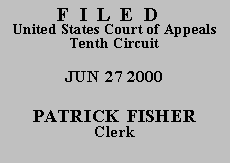

| EQUAL EMPLOYMENT
OPPORTUNITY COMMISSION,
v. NORRIS, a Dover Resources Company, Defendant-Appellee. |
N. Dist. Okla. (D.C. No. 99-CV-195) |
| MELVIN E. EASILEY, Reverend;
MARVIN SAMPLE; DAVID
SAWYER; TERRI MCCONNELL;
GALIAN MURPHY; KENNETH
CARRUTHERS; DONALD
MCCONNELL; CORPORAL TATE,
JR.; RAPHAEL EDWARDS; O.Z.
WALKER, JR.; LAWRENCE
SANDERS; RICHARD PONDS;
EZELL CHATMAN; GEORGE
MCCURDY; DAVID BURKS;
SHAWN CARRUTHERS;
REVEREND RUTH,
Plaintiffs - Appellants, v. NORRIS, a Dover Resources Company, Defendant - Appellee. |
|
Subsequent to the filing of the underlying state court action, Rev. Easiley and several Norris employees filed charges with the EEOC alleging that Norris pursued the state court action to retaliate against Rev. Easiley's for assisting several Norris employees with potential Title VII claims. On March 12, 1999, both Rev. Easiley and the EEOC filed a federal action making similar allegations of retaliation against Norris. In each action, Rev. Easiley and the EEOC sought to enjoin Norris from proceeding with the state court action. On March 17, 1999, the district court denied the motions for injunctive relief. Rev. Easiley and the EEOC appeal these denials of injunctive relief pursuant to 28 U.S.C. § 1292. Because of the substantially similar arguments set forth by the appellants, we consolidated the cases for disposition.
DISCUSSION
EEOC v. Norris
Appeals from an interlocutory order granting or denying a preliminary injunction do not divest the district court of jurisdiction to proceed with the underlying action of the merits. See State of Colorado v. Idarado Mining Co., 916 F.2d 1486, 1490 n.2 (10th Cir. 1990). In August 1999, the district court requested a case management plan from the parties. When neither party complied, the court sue sponte dismissed the underlying action without prejudice, noting that the parties agreed that the "case has been fully decided on the merits" and that "all issues before [the district court] have been adjudicated." See EEOC v. Norris, No. 99-CV-195 (N. Dist. Okla. August 17, 1999) at 1-2. At oral argument, the parties did not adequately advise this court as to the proceedings in the underlying action. The district court's dismissal was a final adjudication on the merits.
The appeal from the denial of the preliminary injunction is therefore mooted by the fact that the district court proceeded to adjudicate the underlying federal action on the merits. A preliminary injunction is by its nature a temporary measure intended to furnish provisional protection while awaiting a final judgment on the merits. See United States ex rel. Berger v. Lawrence, 848 F.2d 1502, 1512 (10th Cir. 1988). Because the underlying action has been dismissed, no party has a "cognizable interest in the appeal's outcome." Keyes v School Dist. No. 1, 895 P.2d 659, 663 (10th Cir. 1990).
The EEOC contends that we have appellate jurisdiction over the district court's denial of the preliminary injunction because we are not precluded from granting the EEOC effective relief. Plaintiff's argument is misplaced. "With the entry of the final judgment, the life of the preliminary injunction [comes] to an end, and it no longer ha[s] a binding effect on any one." Lawrence, 848 F.2d at 1512 (internal quotation omitted). See also SEC v. Mount Vernon Mem'l Park, 664 F.2d 1358, 1361-62 (9th Cir. 1982) (applying the "long-recognized" doctrine that the propriety of preliminary relief merges into a decision on the merits). Accordingly, we dismiss the appeal in case number 99-5068 as moot.
Easiley v. Norris
Before this case was orally argued, Rev. Easiley filed a motion to dismiss the underlying federal action without prejudice. Norris filed a motion to dismiss with prejudice, largely based on Rev. Easiley's apparent discovery abuses. Although the underlying federal action had not been dismissed at the time of oral argument, neither party informed this court of these motions pending before the district court. In an apparent attempt to evade the magistrate judge's imposition of further discovery sanctions, and likely attorneys fees, Rev. Easiley subsequently filed a motion to dismiss with prejudice. The district court granted the motion, and declared all other pending motions moot, save for Norris's pending motion for sanctions. Norris now seeks dismissal of Rev. Easiley's appeal. For substantially the same reasons iterated above, the appeal in case number 99-5089 appeal is now moot and is dismissed.
CONCLUSION
Accordingly, we DISMISS the appeals in cases numbered 99-5068 and 99-5089 as MOOT.
Entered for the Court,
Robert H. Henry
Circuit Judge
*. This order and judgment is not binding precedent, except under the doctrines of law of the case, res judicata, and collateral estoppel. The court generally disfavors the citation of orders and judgments; nevertheless, an order and judgment may be cited under the terms and conditions of 10th Cir. R. 36.3.
**. The Honorable Zita Weinshienk of the United States District Court for the District of Colorado, sitting by designation.